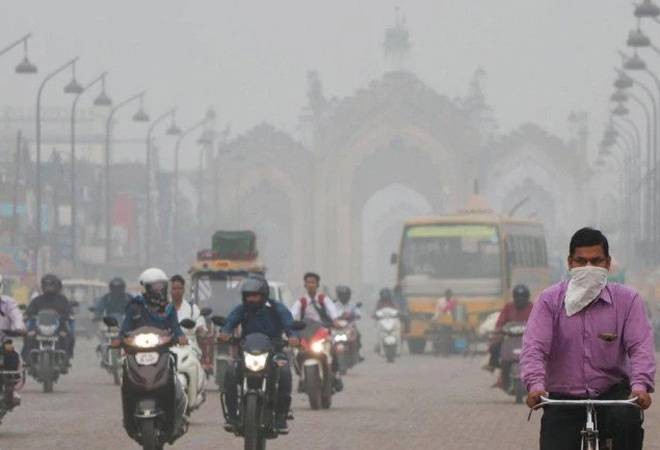Delhi’s Air Quality Crisis: Hospitals Report Alarming Rise in Respiratory Cases Amid Surging Pollution Levels
Delhi’s hospitals are facing a significant rise in respiratory cases, with medical experts attributing the increase to escalating air pollution levels in the city. Health professionals report a 30-40% surge in respiratory issues, affecting children and the elderly most severely. As a dense smog layer blankets the capital, city officials and doctors alike are advising residents to stay indoors, limit outdoor activities, and wear protective masks to reduce exposure to pollutants.
The city’s air quality index (AQI) has remained in the ‘poor’ to ‘very poor’ category for over a week, with stations across Delhi recording levels in the ‘severe’ category. The AQI on Wednesday afternoon stood at a hazardous 367, signifying alarming pollution levels. Dr. Arunesh Kumar, a respiratory medicine consultant at Paras Health in Gurugram, pointed out that the concentration of harmful pollutants like PM2.5, PM10, and nitrogen dioxide (NO2) has spiked due to colder weather and stagnant air, making it difficult for these particles to disperse. Both PM2.5 and PM10 particles are particularly dangerous as they are small enough to bypass the body’s natural defenses, entering deep into the respiratory system and even reaching the bloodstream.
Dr. Kumar explained that Delhi’s winter months exacerbate pollution due to a mix of low wind speeds, falling temperatures, and high moisture, which trap pollutants in the air. This creates an almost inescapable cloud of harmful particles. Medical professionals are already seeing patients with symptoms like dry cough, eye irritation, and breathlessness, a situation likely to worsen post-Diwali due to firecracker usage and stubble burning in nearby states. Resident doctor Anshita Mishra from Maulana Azad Medical College confirmed the early onset of seasonal complaints, with an uptick in respiratory and ophthalmic issues among patients. She advised people to wear cloth or surgical masks and avoid outdoor activities, adding that children, who have underdeveloped immune systems, are especially susceptible to asthma and allergies triggered by pollution.
In addition to respiratory symptoms, pollution is also causing dermatological issues among children and adults. Mishra pointed out that high pollution levels increase the risk of skin irritation and other allergic reactions due to continuous exposure to dust and harmful particles. With the deteriorating air quality, children in metro cities like Delhi face prolonged exposure to poor air, increasing the risk of long-term respiratory conditions like asthma. Health experts suggest children and sensitive groups stay indoors and use effective air filtration masks, such as N95, when going outdoors, as cloth and surgical masks fail to offer sufficient protection against microscopic pollutants like PM2.5.
For Delhi’s elderly population, pollution poses additional challenges, particularly for those with pre-existing conditions such as asthma, bronchitis, or cardiovascular disease. Dr. Mukul Mohan Mathur, a senior physician and TB specialist, noted a 25-30% increase in respiratory problems among older adults. He cautioned against morning walks or outdoor exercise when the AQI exceeds safe levels, as outdoor physical activity during high pollution peaks can aggravate respiratory conditions. According to Dr. Mathur, about 60-70% of patients in outpatient departments are reporting respiratory syndromes, with common complaints of allergies and pollution-induced bronchitis. Patients with asthma are particularly at risk, as pollution often exacerbates their symptoms, leading to bronchitis and other serious respiratory issues.
The alarming pollution levels have led to the implementation of Stage II of the Graded Response Action Plan (GRAP), which restricts certain activities to curb pollution. This includes a ban on coal and firewood use, such as tandoors in hotels and eateries, and prohibits the use of diesel generator sets except for emergency services. Dr. Rajat Sharma, a resident doctor at UCMS and GTB Hospital, explained that the impact of air pollution extends beyond the lungs to multiple organs. Pollutant particles, especially PM2.5, are small enough to enter the bloodstream, affecting the cardiovascular, neurological, reproductive, and endocrine systems. Respiratory symptoms like shortness of breath have surged, with some patients experiencing worsening asthma and prolonged upper respiratory tract infections, signaling the significant burden on public health infrastructure.
The cumulative impact of pollution on long-term health is a growing concern. Dr. Rommel Tickoo, Director of Internal Medicine at Max Super Speciality Hospital, Saket, observed an increase in cases of cough, cold, and wheezing, particularly in elderly patients and those with underlying health conditions. Adjustments in medication dosages, such as inhalers, have become necessary for many patients as pollution-related symptoms become more severe. Dr. Tickoo noted additional symptoms like fatigue, headaches, and even insomnia among patients, attributing these conditions to prolonged exposure to pollutants. He warned that consistent exposure to high pollution levels could potentially lead to chronic neurological disorders over time, further emphasizing the need for urgent measures to address air quality.
Delhi’s seasonal pollution crisis underscores the pressing need for stringent actions to protect public health. Health experts continue to advise the public to adopt protective measures, including limiting time outdoors, especially during peak pollution hours, wearing N95 masks, and avoiding the use of firecrackers to minimize their impact on air quality. Public health warnings and GRAP restrictions serve as immediate responses to Delhi’s air quality crisis, but sustained efforts, both from residents and policymakers, are essential to improve the city’s air quality and reduce the health burden on its citizens.


